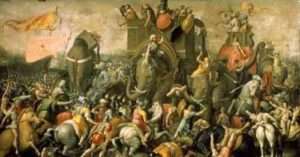The Fifth Day
At dawn on the fifth day, Bhishma, the supreme master of Dhanur Veda, arranged the army according to the forms of the makara. To these the Pandavas responded with the tactical disposition of the hawk.
Again the warriors clashed with unspeakable fury.
The sound of swords, the flicker of spears and arrows, the roar of the explosions of the various celestial weapons and dozens of other frightening noises mingled with the cries of war, the calls of challenges, the orders of the commanders and the lamentations of the wounded and the dying. They were terrible death scenes.
Determined not to give him too much initiative, Bhima opposed the enemy commander, but his superhuman strength was not enough. Thus Arjuna had to intervene against the son of Ganga, who could hardly contain the devastating action. Bhima, on the other hand, did not lose heart and, seeing some of Dhritarastra’s children nearby, he set out in pursuit of them. Duryodhana immediately ran to Drona.
“Look at Bhima: he is about to throw himself at my brothers. What are you and the others doing? Run to their aid!”
“You are a fool,” the acarya replied angrily. “It is useless for you to blame us when we are doing our best to lead you to victory. But don’t you realize how strong your hated enemies are?”
And without even waiting for the disciple’s reply, Drona returned to the heart of the battle, where he was promptly confronted by Satyaki. The ensuing duel was spectacular.
Simultaneously, for the first time Bhishma and Shikhandi met face to face. Shikhandi was none other than the reincarnation of Amba who in that life had been reborn as a woman and only later, thanks to a Yaksha, had she acquired the male sexual organs. Not wanting to respond to the opponent’s attacks, Bhishma accepted them without blinking.
Meanwhile Drona, who was seriously engaged in a fight against Satyaki, became aware of the critical situation in which Bhishma had found himself and remembered Duryodhana’s warnings: the elder had to be protected from Shikhandi, because he would have refused to react to his attacks. Although Bhishma was completely helpless in front of him, Shikhandi continued to hit him, piercing him with his arrows in several places on the body, so as to make him bleed profusely. The five Pandava brothers, seeing the Panchala in an advantageous position, joined him and attacked in force. The ground was soaked in blood and entirely paved with bodies, so much so that moving with the chariots began to be difficult. Virata also came to lend a hand, piercing Bhishma with a sharp arrow.
Meanwhile, Asvatthama and Arjuna had begun a furious duel under the eyes of Drona, who was smiling, delighted at how much his son and his favorite disciple had learned to fight. But Arjuna, out of respect for the guru’s son, moved to another front and avoided continuing the duel.
Bhima and Abhimanyu continued to sow panic: Duryodhana tried to oppose the prodigious boy while he, penetrating inside his army, divided it into two parts; but he was badly wounded in the chest. Seeing his father in trouble, Lakshmana also intervened, but he too had been reduced to nothing and was miraculously saved by Kripa.
That day Arjuna’s favorite disciple, Satyaki, was in great shape; all found in him the same rapidity of movements, the same lightness of touch and the same power of the master. They admired the grace and effectiveness of his actions, which forced the arch enemy Bhurishrava to flee.
At sunset Bhishma ordered the retreat; the survivors, tired and wounded, returned to the camp.
That evening it was Arjuna who felt particularly depressed: he hated having to fight against his beloved grandfather, against the venerable Drona, and Kripa and thousands of other friends and relatives. He hated that war and Duryodhana who had promoted it.
This is a section of the book “Maha-bharata, Vol. 2”.
To buy the complete book, click above
Post view 289 times



